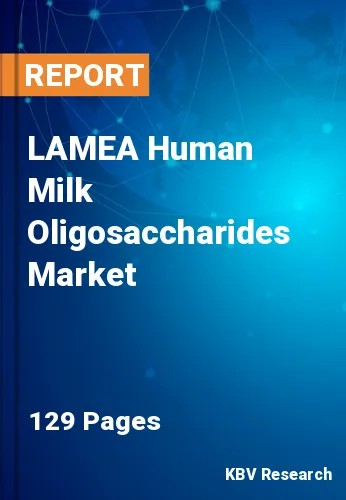
The Latin America, Middle East and Africa Human Milk Oligosaccharides Market would witness market growth of 25.5% CAGR during the forecast period (2023-2030).
One of the primary drivers of the HMOs is the growing understanding of the nutritional significance of these complex sugars in human breast milk. HMOs serve as prebiotics, promoting the growth of beneficial gut bacteria in infants. This, in turn, contributes to developing a healthy immune system and lowering the risk of infections. Research has also suggested that HMOs support cognitive development, further elevating their importance in infant nutrition. As a result, HMOs have gained attention as a critical component contributing to the health and well-being of breastfed infants.
Technological advancements in biotechnology have played a pivotal role in the development and commercialization of HMOs. Researchers and companies are investing in innovative production methods, such as microbial fermentation and enzymatic synthesis, to produce HMOs on a larger scale. These advancements not only contribute to the accessibility of HMOs but also open doors to customization, allowing for the creation of specific HMO profiles to address varying nutritional needs. The regulatory landscape surrounding infant nutrition is evolving to accommodate the inclusion of HMOs in commercial products.
Brazil has a substantial market for infant formula, driven by factors such as changing lifestyles, working mothers, and the convenience of formula feeding. As manufacturers seek to enhance the nutritional content of formula, the incorporation of HMOs has gained traction. Like in many other regions, parents in Brazil are increasingly seeking formula options that offer additional health benefits, and HMO-enriched formulas address this demand. Collaborations between HMO manufacturers, formula producers, and research institutions contribute to the innovation in formula formulations. This collaboration leads to the development of products that meet the nutritional needs of infants. These aspects will boost market growth in the coming years.
The Brazil market dominated the LAMEA Human Milk Oligosaccharides Market, by Country in 2022, and would continue to be a dominant market till 2030; thereby, achieving a market value of $20,544 Thousand by 2030, growing at a CAGR of 24.2 % during the forecast period. The Argentina market is showcasing a CAGR of 26.2% during (2023 - 2030). Additionally, The UAE market would register a CAGR of 25.2% during (2023 - 2030).
Based on Application, the market is segmented into Infant Formula, Functional Food & Beverages, Food Supplements, and Others (Clinical Nutrition & Pharmaceuticals). Based on Type, the market is segmented into 2'FL, 3'FL, 3'SL, and 6'SL. Based on Concentration, the market is segmented into Neutral, and Acidic. Based on countries, the market is segmented into Brazil, Argentina, UAE, Saudi Arabia, South Africa, Nigeria, and Rest of LAMEA.
Free Valuable Insights: The Worldwide Human Milk Oligosaccharides Market is Projected to reach USD 1 Billion by 2030, at a CAGR of 23.3%
The market research report covers the analysis of key stake holders of the market. Key companies profiled in the report include Koninklijke DSM N.V., BASF SE, Chr. Hansen Holding A/S, DuPont de Nemours, Inc., Nestle S.A, Inbiose NV, Biosynth AG, Abbott Laboratories, Royal FrieslandCampina N.V. and Dextra Laboratories Ltd (ICE S.p.A).
By Application
By Type
By Concentration
By Country
Our team of dedicated experts can provide you with attractive expansion opportunities for your business.
